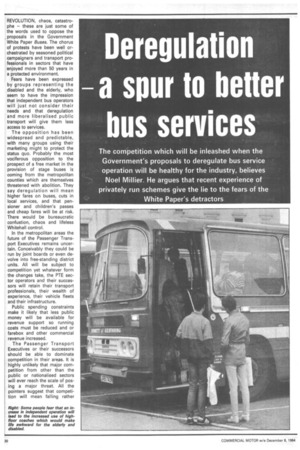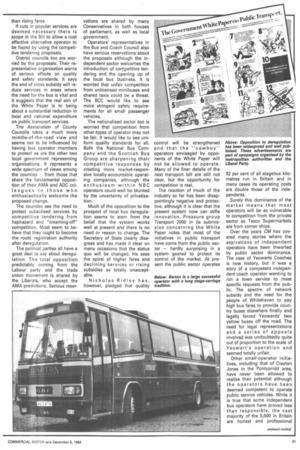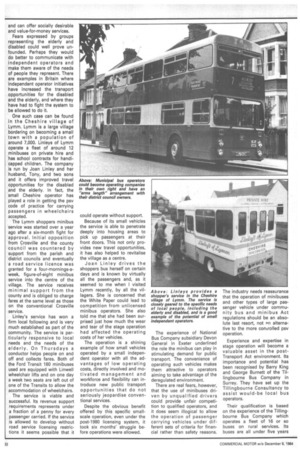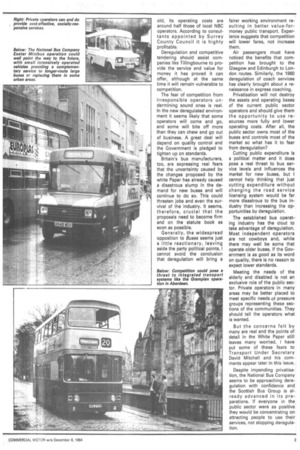Deregulation a spur to better bus services
Page 32

Page 33

Page 34

Page 35

If you've noticed an error in this article please click here to report it so we can fix it.
REVOLUTION, chaos, catastrophe — these are just some of the words used to oppose the proposals in the Government White Paper Buses. The chorus of protests have been well orchestrated by seasoned political campaigners and transport professionals in sectors that have enjoyed more than 50 years in a protected environment.
Fears have been expressed by groups representing the disabled and the elderly, who seem to have the impression that independent bus operators will just not consider their needs and that deregulation and more liberalised public transport will give them less access to services.
The opposition has been widespread and predictable, with many groups using their marketing might to protect the status quo. Probably the most vociferous opposition to the prospect of a free market in the provision of stage buses is coming from the metropolitan counties which are themselves threatened with abolition. They say deregulation will mean higher fares on buses, cuts in local services, and that pensioner and children's passes and cheap fares will be at risk. There would be bureaucratic confustion, chaos and lifeless Whitehall control.
In the metropolitan areas the future of the Passenger Transport Executives remains uncertain. Conceivably they could be run by joint boards or even devolve into free-standing district units. All will be subject to competition yet whatever form the changes take, the PTE sector operators and their successors will retain their transport professionals, their wealth of experience, their vehicle fleets and their infrastructure.
Public spending constraints make it likely that less public money will be available for revenue support so running costs must be reduced and or farebox and other commercial revenue increased.
The Passenger Transport Executives or their successors should be able to dominate competition in their areas. It is highly unlikely that major competition from other than the public or nationalised sectors will ever reach the scale of posing a major threat All the pointers suggest that competition will mean falling rather than rising fares.
If cuts in popular services are deemed necessary there is scope in the Bill to allow a cost effective alternative operator to be found by using the competitive tendering proposals.
District councils too are worried by the proposals. Their representative organisation warns of serious effects on quality and safety standards. It says the end of cross subsidy will reduce services in areas where the need for the bus is vital and it suggests that the real aim of the White Paper is to being about a substantial reduction in local and national expenditure on public transport services.
The Association of County Councils takes a much more middle-of-the-road view and seems not to be influenced by having bus operator members to protect as are the other two local government representing organisations. It represents a wide spectrum of views among the counties — from those that share the fundamental opposition of their AMA and ADC colleagues to those who enthusiastically welcome the proposed change.
The counties see the need to protect subsidised services by competitive tendering from haphazard and "creaming-off" competition. Most seem to believe that they ought to become the route registration authority after deregulation.
The political parties all have a great deal to say about deregulation. The total opposition predictably coming from the Labour party and the trade union movement is shared by the Liberals, who accept the AMA predictions. Serious reser vations are shared by many Conservatives in both houses of parliament, as well as local government.
Operators' representatives in the Bus and Coach Council also have serious reservations about the proposals although the independent sector welcomes the introduction of competitive tendering and the opening up of the local bus business. It is worried that unfair competition from unlicensed minibuses and shared taxis could be a threat. The BCC would like to see more stringent safety requirements for all small passenger vehicles.
The nationalised sector too is worried that competition from other types of operator may not be fair. It would like to see uniform quality standards for all. Both the National Bus Company and the Scottish Bus Group are sharpening their competitive responses by creating more market-responsive locally-accountable operating companies, although the enthusiasm within NBC operators could well be blunted by the uncertainty of privatisation.
Much of the opposition to the prospect of local bus deregulation seems to stem from the belief that the system works well at present and there is no need or reason to change. The Secretary of State clearly disagrees and has made it clear on many occasions that the status quo will be changed. He sees the spiral of higher fares and declining services or rising subsidies as totally unacceptable.
Nicholas Ridley has, however, pledged that quality control will be strengthened and that the "cowboy" operators envisaged by opponents of the White Paper will not be allowed to operate. Many of the finer details of the next transport bill are still not clear, but the opportunity for competition is real.
The reaction of much of the industry so far has been disappointingly negative and protective, although it is clear that the present system now can stifle innovation. Pressure group Transport 2000 in its submission concerning the White Paper notes that most of the initiatives in public transport have come from the public sector — hardly surprising in a system geared to protect its control of the market. At present the public sector operates 92 per cent of all stagebus kilometres run in Britain and in many cases its operating costs are double those of the independents.
Surely this dominance of the market means that most operators will be as vulnerable to competition from the private sector as Tesco Supermarkets are from corner ships.
Over the years CM has covered many stories where the aspirations of independent operators have been thwarted by public sector dominance. The case of Yeowarts Coaches is now history, but it was a story of a competent independent coach operator wanting to run a town service to meet specific requests from the public. The spectre of network subsidy and the need for the people of Whitehaven to pay high bus fares to provide country buses elsewhere finally and legally forced Yeowards' two yellow buses off the road. The need for legal representations and a series of appeals involved was undoubtedly quite out of proportion to the scale of Yeowart's operation and seemed totally unfair.
Other small-operator initiatives, including that of Clayton Jones in the Pontypridd area, have never been allowed to realise their potential although the operators have been deemed competent to operate public service vehicles. While it is true that some independent bus operators have proved less than responsible, the vast majority of the 5,500 in Britain are honest and professional and can offer socially desirable and value-for-money services.
Fears expressed by groups representing the elderly and disabled could well prove unfounded. Perhaps they would do better to communicate with independent operators and make them aware of the needs of people they represent. There are examples in Britain where independent operator initiatives have increased the transport opportunities for the disabled and the elderly, and where they have had to fight the system to be allowed to do it.
One such case can be found in the Cheshire village of Lymm. Lymm is a large village bordering on becoming a small town with a population of around 7,000. Linleys of Lymm operate a fleet of around 12 minibuses on private hire and has school contracts for handicapped children. The company is run by Joan Linley and her husband, Tony, and two sons and it offers improved travel opportunities for the disabled and the elderly. In fact, the small Cheshire operator has played a role in getting the psv code of practice for carrying passengers in wheelchairs accepted.
The Lymm shoppers minibus service was started over a year ago after a six-Month fight for approval. Initial opposition from Crosville and the county council was countered by support from the parish and district councils and eventually a road service licence was granted for a four-mornings-aweek, figure-of-eight minibus service into the centre of the village. The service receives minimal support from the county and is obliged to charge fares at the same level as those on the conventional Crosville service.
Linley's service has won a firm local following and is very much established as part of the community. The service is particularly responsive to local needs and the needs of the elderly. On Thursdays a conductor helps people on and off and collects fares. Both of the Ford Transit 160 minibuses used are equipped with Linwell wheelchair lifts and on one day a week two seats are left out of one of the Transits to allow the accommodation of wheelchairs.
The service is viable and successful. Its revenue support requirements represents under a fraction of a penny for every passenger carried. If the service is allowed to develop without road service licensing restrictions it seems possible that it
could operate without support.
Because of its small vehicles the service is able to penetrate deeply into housing areas to pick up passengers at their front doors. This not only provides new travel opportunities, it has also helped to revitalise the village as a centre.
Joan Linley drives the shoppers bus herself on certain days and is known by virtually all the passengers and, as it seemed to me when I visited Lymm recently, by all the villagers. She is concerned that the White Paper could lead to competition from unlicensed minibus operators. She also told me that she had been surprised just how much the wear and tear of the stage operation had affected the operating costs of her vehicles.
The operation is a shining example of how small vehicles operated by a small independent operator with all the advantages of low operating costs, directly involved and motivated management and workforce and flexibility can introduce new public transport opportunities that do not seriously jeopardise conventional services.
Despite the obvious benefit offered by this specific smallscale operation, even under the post-1980 licensing system, it took six months' struggle before operations were allowed. The experience of National Bus Company subsidiary Devon General in Exeter underlined the role the minibus can play in stimulating demand for public transport. The convenience of operating such vehicles makes them attractive to operators aiming to take advantage of the deregulated environment.
There are real fears, however, that the use of minibuses driven by unqualified drivers could provide unfair competition to qualified operators, and it does seem illogical to allow the operation of passenger carrying vehicles under different sets of criteria for financial rather than safety reasons. The industry needs reassurance that the operation of minibuses and other types of large passenger vehicle under community bus and minibus Act regulations should be an absolute last resort, not sn alternative to the more conirolled psv operation.
Experience and expertise in stage operation will become a valuable asset in the postTransport Act environment. Its importance and potential has been recognised by Barry King and George Burnett of the Tillingbourne Bus Company in Surrey. They have set up the Tillingbourne Consultancy to assist would-be local bus operators.
Their qualification is based on the experience of the Tillingbourne Bus Company which operates a fleet of 16 or so buses on rural services. Its buses are all under five years old, its operating costs are around half those of local NBC operators. According to consultants appointed by Surrey County Council it is highly profitable.
Deregulation and competitive tendering should assist cornpanies like Tillingbourne to provide the service and value for money it has proved it can offer, although at the same time it will remain vulnerable to competition.
The fear of competition from irresponsible operators undermining sound ones is real. In the new deregulated environment it seems likely that some operators will come and go, and some will bite off more than they can chew and go out of business. A great deal will depend on quality control and the Government is pledged to tighten up on standards.
Britain's bus manufacturers, too, are expressing real fears that the uncertainty caused by the changes proposed by the white Paper has already caused a disastrous slump in the demand for new buses and will continue to do so. This could threaten jobs and even the survival of the industry. It seems, therefore, crucial that the proposals need to become firm and on the statute book as soon as possible.
Generally, the widespread opposition to Buses seems just a little reactionary, leaving aside the party political points, I cannot avoid the conclusion that deregulation will bring a
fairer working environment resulting in better value-formoney public transport. Experience suggests that competition will lower fares, not increase them.
Air passengers must have noticed the benefits that competition has brought to the Glasgow and Edinburgh to London routes. Similarly, the 1980 deregulation of coach services has clearly brought about a renaissance in express coaching.
Privatisation will not destroy the assets and operating bases of the current public sector operators and should give them the opportunity to use resources more fully and lower operating costs. After all, the public sector owns most of the buses and controls most of the market so what has it to fear from deregulation?
Cutting public expenditure is a political matter and it does pose a real threat to bus service levels and influences the market for new buses, but I cannot help thinking that just cutting expenditure without changing the road service licensing system would be far more disastrous to the bus industry than increasing the opportunities by deregulation.
The established bus operating industry has the clout to take advantage of deregulation. Most independent operators are not cowboys and, while there may well be some that operate older buses, if the Government is as good as its word on quality, there is no reason to expect lower standards.
Meeting the needs of the elderly and disabled is not an exclusive role of the public sector. Private operators in many areas may be better placed to meet specific needs of pressure groups representing these sections of the communities. They should tell the operators what is wanted.
But the concerns felt by many are real and the points of detail in the White Paper still leaves many worried. I have put some of these fears to Transport Under Secretary David Mitchell and his comments appear later in this issue.
Despite impending privatisation, the National Bus Company seems to be approaching deregulation with confidence and the Scottish Bus Group is already advanced in its preparations. If everyone in the public sector were as positive they would be concentrating on attracting people to use their services, not stopping deregulation.




























































































